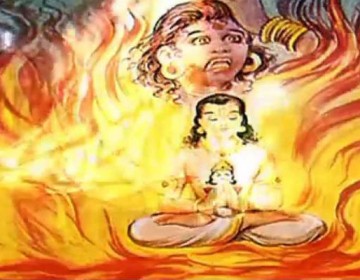Renunciation stands for non-attachment to all pleasures, ranging from the enjoyment of the tangible objects found on the earth to that of happiness a virtuous soul experiences in heaven. A keen follower of the Vedanta must not only be able to discriminate between real and unreal but also must be capable enough to give up the unreal.
Let’s analyze now that what is real and what is non-real. The subtle God, which is prevailing all around is the only real one. The other materialistic possessions, coupled with the amenities, commodities and all the materialistic wealth is the play of the life. If we further ponder into this matter, it comes that the life is a play. God is a director, and we have been assigned a role to play. All the activities we perform are the drama and the relatives, brothers, sisters all are relations given to us to pay our duties keenly and wholeheartedly. No doubt , we are supposed to lead a balanced and prosperous life, still the philosophy of detached attachment also prevails, which pertains that while performing our worldly duties, we are supposed to remain attached but in the detached way.
Too often, the unreal appears to us in the form of guise of the real and too often, we sometimes, lack the power to renounce even what we know to be real. So it becomes highly mandatory here to give more of the preference to the real and taking into consideration of unreal too. This world is full of the illusions and the attachment towards this strong world makes us to realize the sense of belongingness with the world. While proceeding and prospering, we tend to attach more and more with the unreal. What an irony of the man that inspite of the real wealth and contentment, man is more lured towards the worldly possessions, and the mind is all the time gets attached with it. So renunciation is the most important virtue of a devotee which is bounded to practice for its proper implementation and following.













